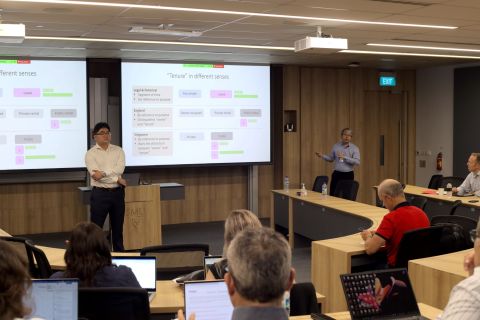
By Stuart Pallister
SMU Office of Research – In his book ‘Freefall: Free Markets and the Sinking of the Global Economy’ which examines the causes of the global financial crisis of 2008, Nobel laureate Joseph Stiglitz writes: “In the Frankenstein laboratory of Wall Street, banks created new risk products … without mechanisms to manage the monster they had created.” Those new products included collateralised debt instruments.
In the two years before the financial crisis, Singapore Management University Associate Professor of Finance Hu Jianfeng was working as a junior analyst with an investment bank in Singapore on its credit derivatives trading desk.
“We were handling products like CDOs (collateralised debt obligations) and these were covered extensively by the media for causing the financial crisis to some extent.”
Professor Hu left the bank just months before the global financial crisis in 2008 to pursue a finance PhD in New York. His main motivation for becoming an academic, he says, was “to understand whether the pricing models we were using were flawed”.
“Many people have told me I timed it well but, as an insider, I kind of saw the crisis coming.”
“As a junior analyst, I was wondering how sophisticated financial derivatives could have caused huge problems – although back in early 2008 I had definitely no knowledge about how severe the impact could be.”
“Derivatives are artificially created financial instruments and people always cite the motivation of hedging. So, presumably with derivatives you can better manage risk.”
Professor Hu told the Office of Research that derivatives should mean “less risk, not more. But, in reality, we see how many times people associate turmoil in the financial markets to the use of derivatives.”
That has led him to wonder whether derivatives, which are used by what he calls “more unsophisticated people” to hedge risk, add value to the real economy at all.
“The negative presence is usually during some extreme periods. On average, I believe it shows some positive externality of financial market innovation.”
“With derivatives, sophisticated traders have expanded their trading opportunities. They can structure very complex deals to bet on certain types of market movements and this allows more market participation. So, in general, it improves market liquidity and facilitates informed trading. So private information can be incorporated into asset prices more quickly.”
In a paper which is yet to be published, titled ‘Information Spillover and Corporate Policies: The Case of Listed Options’, Professor Hu and his co-researchers try to pin down whether changes in a company’s information environment impact its corporate behaviour.
In the study, they compare corporate policies before and after the introduction of options – financial derivatives which give buyers the right to buy or sell an underlying asset by a certain date and at a specific price – to see whether there were any changes in the behaviour of the underlying firm which effectively has no say in whether options can be traded on its stock. That is the prerogative of an options exchange such as the one in Chicago.
‘Private information’ does not necessarily mean illegal inside information, Professor Hu says. Company insiders may have insights which are not available to others, but outsiders may know more about a firm’s competitors, suppliers and the macroeconomy.
With the introduction of options, “there should be more information in the market and the stock price should become more efficient. So that’s the premise.”
“Most researchers look at the impact of derivatives’ introduction on the underlying asset price or volatility as a starting point. My angle is different. I want to look at whether financial derivatives will change market participants’ behaviour. And in this case, I’m interested in the managers of the underlying firms.”
“So, my question is: after financial derivatives become available on the company’s stock, will the company’s top executives behave differently in, let’s say, accessing capital markets, making real investments and doing innovation?
According to the findings of this study, the answer seems to be a resounding yes.
Professor Hu said it was somewhat ‘ironic’ that he had chosen this topic; this is his first corporate finance paper as he normally focuses on asset pricing and investment research.
In the draft paper, the researchers state that ‘altogether, our results provide a coherent picture of how improved information quality affects corporate policies.’
Firms can more frequently access external capital thanks to ‘positive information shocks’, with the result that they can ‘achieve lower financial leverage,’ conduct fewer buybacks and pay lower dividends.
The paper continues: ‘on the asset side, firms with listed options invest at greater levels and build larger cash reserves.’
Professor Hu says their paper “definitely contributes to the debate on whether financial derivatives are good or bad, and whether they should be regulated more, or less.”
“Capital markets can have a real impact on corporate behaviour and that’s what I want to show in the study.”
The paper, titled ‘Information Spillover and Corporate Policies: The Case of Listed Options’ is currently in the editorial process, awaiting publication in a journal. Professor Hu’s co-researchers are Gennaro Bernile, an associate professor at the University of Miami; Guangzhong Li, a professor at Sun Yat-Sen University in China; and Roni Michaely, a professor of Finance and Entrepreneurship at Hong Kong University.
Back to Research@SMU May 2023 Issue
See More News
Want to see more of SMU Research?
Sign up for Research@SMU e-newslettter to know more about our research and research-related events!
If you would like to remove yourself from all our mailing list, please visit https://eservices.smu.edu.sg/internet/DNC/Default.aspx

